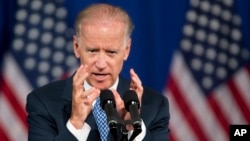WASHINGTON —
The United States is ready to engage in dialog with North Korea, but only if Pyongyang is prepared for “genuine” negotiations and commits to giving up its nuclear ambitions, Vice President Joe Biden said on Thursday.
Biden, who gave a speech on U.S. policy on Asia before a visit next week to India and Singapore, also encouraged China and the 10-member Association of Southeast Asian Nations (ASEAN) to speed up talks to resolve a long dispute over boundaries in the South China Sea.
“Economic growth critically depends on peace and stability,” Biden said. “It's critical that all nations have a clear understanding of what constitutes acceptable international behavior.”
North Korea offered talks with Washington after tensions spiked earlier this year when Pyongyang threatened the United States and South Korea with a nuclear strike.
Biden, who plays a leading role in U.S. foreign policy, chuckled about the offer.
“As my mother would say, 'I've seen this movie before,”' Biden said. “We are ready, but only - only - if North Korea is prepared to engage in genuine negotiations.”
Biden said the United States would reject what he described as North Korea's “pattern of provoking a crisis and then insisting they be rewarded in order to cease and desist,” followed by a return to “their nuclear march.”
On the long-simmering dispute over the oil-rich South China Sea, where China has asserted claims over large parts of the territory and made its presence felt by stepping navy patrols, Biden said the United States had a strong interest in seeing an agreement on new maritime rules.
“That means no intimidation, no coercion, no aggression - and a commitment from all parties to reduce the risk of mistake and miscalculation,” he said.
China has been talking with its ASEAN counterparts, but progress has been limited.
“I encourage China and ASEAN to work even more quickly to reach an agreement on a code of conduct for the South China Sea,” Biden said. “It's in everyone's interest that there be freedom of navigation, unimpeded lawful commerce, respect for international laws and norms, and peaceful resolution of territorial disputes.”
Biden, who gave a speech on U.S. policy on Asia before a visit next week to India and Singapore, also encouraged China and the 10-member Association of Southeast Asian Nations (ASEAN) to speed up talks to resolve a long dispute over boundaries in the South China Sea.
“Economic growth critically depends on peace and stability,” Biden said. “It's critical that all nations have a clear understanding of what constitutes acceptable international behavior.”
North Korea offered talks with Washington after tensions spiked earlier this year when Pyongyang threatened the United States and South Korea with a nuclear strike.
Biden, who plays a leading role in U.S. foreign policy, chuckled about the offer.
“As my mother would say, 'I've seen this movie before,”' Biden said. “We are ready, but only - only - if North Korea is prepared to engage in genuine negotiations.”
Biden said the United States would reject what he described as North Korea's “pattern of provoking a crisis and then insisting they be rewarded in order to cease and desist,” followed by a return to “their nuclear march.”
On the long-simmering dispute over the oil-rich South China Sea, where China has asserted claims over large parts of the territory and made its presence felt by stepping navy patrols, Biden said the United States had a strong interest in seeing an agreement on new maritime rules.
“That means no intimidation, no coercion, no aggression - and a commitment from all parties to reduce the risk of mistake and miscalculation,” he said.
China has been talking with its ASEAN counterparts, but progress has been limited.
“I encourage China and ASEAN to work even more quickly to reach an agreement on a code of conduct for the South China Sea,” Biden said. “It's in everyone's interest that there be freedom of navigation, unimpeded lawful commerce, respect for international laws and norms, and peaceful resolution of territorial disputes.”





